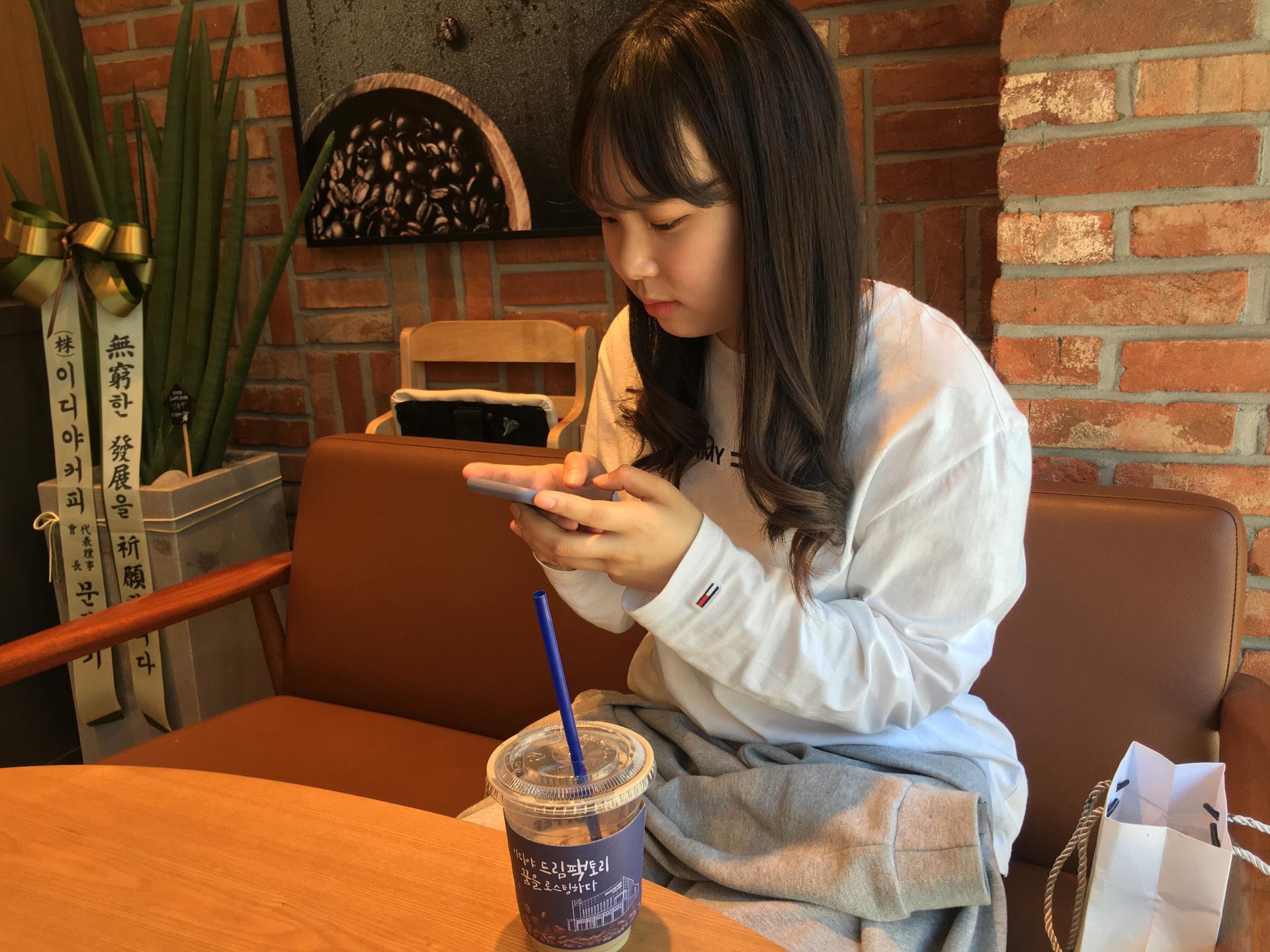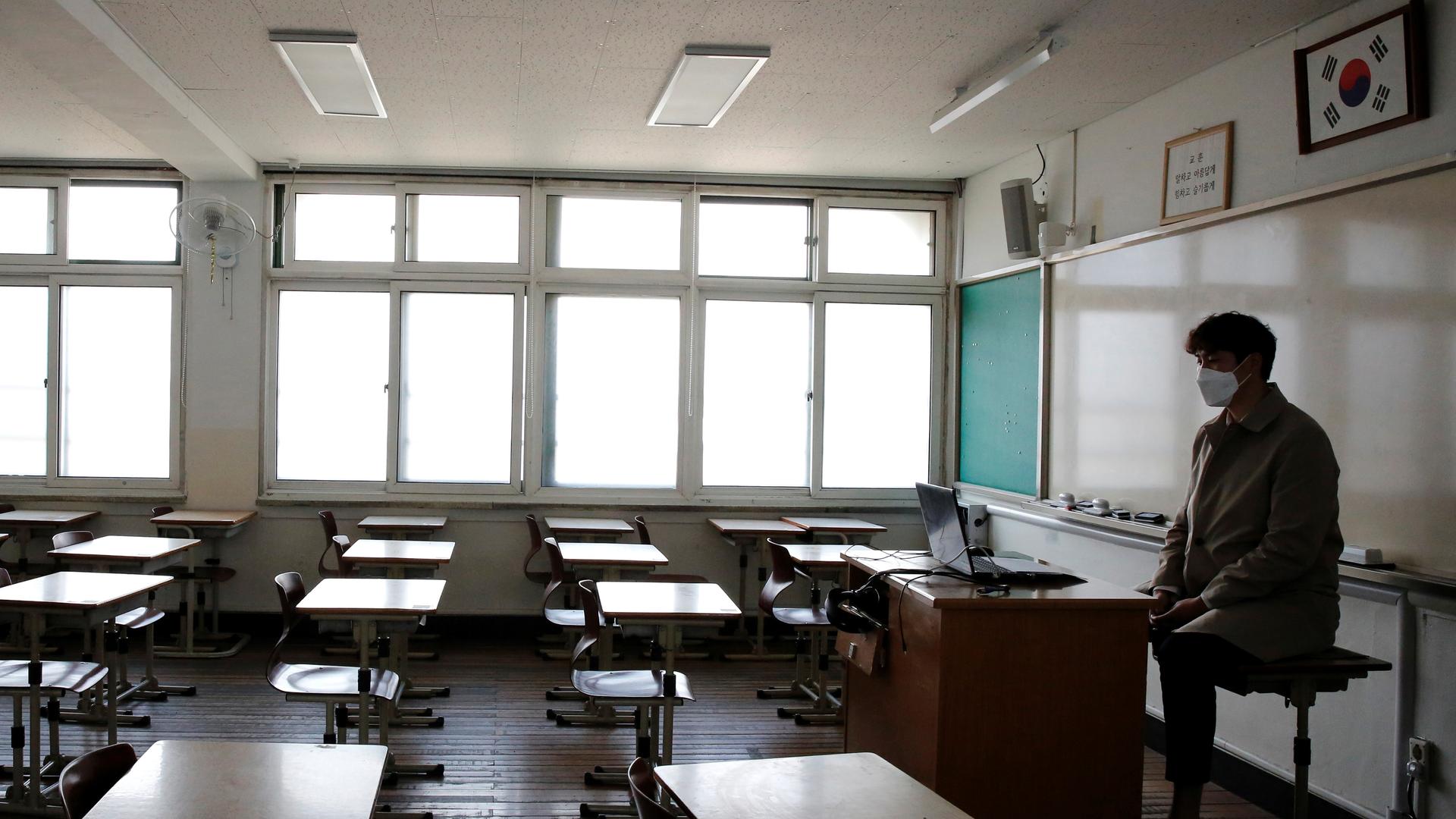A teacher gives an online class at school, amid the coronavirus disease (COVID-19) outbreak, in Seoul, South Korea, April 9, 2020.
South Korean high school seniors will be the first students to return to the classroom after the coronavirus delayed the start of the academic year. For many, the pandemic didn’t just disrupt their education; it cast their entire futures into uncertainty.
On Wednesday, schools across the country will partially reopen to allow students in their final year of primary education to resume in-person learning. A large COVID-19 outbreak in February forced the government to postpone the start of the school year, which typically begins in March, by several weeks. And last month, all students began receiving online instruction.
Related: South Korea flattened the curve. Now what?
South Korea’s Education Ministry said in a press release that it will reopen schools just for seniors due to their “urgent academic needs.” Students in lower grade levels will gradually return to schools in the upcoming weeks.
Classes were set to resume on May 13, but a cluster infection detected earlier this month in Seoul, the capital, prompted officials to extend school closures by an additional week.
Some seniors, like Jung Ujin, who studies video production at a specialized high school in Seoul, say they can’t wait much longer to get back into the classroom, despite lingering health concerns posed by the epidemic. Jung explains that virtual classes can’t prepare students for the tests and other requirements they need to gain acceptance into good universities and she feels like the delay has made her “fall behind” in her studies.
“We are panicking because we haven’t been able to go to school. I feel like I am at a disadvantage now. I really feel like I am in a hurry to get back to class.”
“We are panicking because we haven’t been able to go to school,” the 18-year old says. “I feel like I am at a disadvantage now. I really feel like I am in a hurry to get back to class.”
The third and final year of high school in South Korea is almost entirely devoted to preparing for a university entrance examination known as the suneung. It’s widely considered the most important test a Korean will ever take and determines the trajectory of one’s academic and professional career.
Now, because of the delays and imposition of online learning brought on by the coronavirus, many high school seniors say they intend to double down on studying so to make up for this lost and valuable time — as if the rest of their lives depended on it.
Related: Is South Korea’s approach to containing coronavirus a model?

“Whatever I decide to major in or whatever career I want to pursue will now be more difficult,” says Park Ji-yun, 17, adding it was difficult to avoid distraction while taking her school’s online lessons. “I don’t think I’ve been able to prepare enough to go to university and I need to do a lot more studying now.”
Park, who intends to study tourism in college, says she plans to rewatch online lectures and study more with her classmates to compensate for this “setback” in her education.
To allow students more time to prepare for the suneung, the Education Ministry has pushed back the test date from Nov. 19 to Dec. 3.
Some observers say the coronavirus epidemic is putting added stress on students from this year’s graduating class, who would even in normal times feel “immense pressure” to win admission to top schools by acing the university entrance exam.
“There’s a very narrow conception of what it means to be successful in Korean society,” says Ji-young Lee, who is completing her PhD in multicultural education at the University of Washington in Seattle.
Lee, who formerly taught high school classes in South Korea, explains many students are under a belief reinforced by their parents and teachers that the path to a successful life begins with the suneung.
“If you are a good student who scores high, your life is just going to be fine, you’re going to be happy, you’re going to have a pretty or handsome girlfriend or boyfriend and your life’s problems are all going to be solved,” she says.
Lee adds that students who do not achieve high marks on the test sometimes feel that their lives are “worthless.”
Related: South Korea votes amid COVID-19 pandemic
Some Korean students and their parents are compensating for the lost classroom time by spending extra hours and money on private tutoring.
Even though public schools have been close throughout the pandemic, many of these institutes kept their doors open during much of the past two months.
Eun Soo-yoon, a 17-year old senior who attends a foreign language high school in Seoul, has been taking extracurricular courses for the past few weeks.
She says she is not overly concerned about the college entry test, but many of her classmates are “freaking out” right now. Eun says she’s more concerned about the potential risks of returning to school while new COVID-19 cases are still being recorded.
“I am quite worried since we are the first ones to return in South Korea and we don’t know if it’s totally safe,” she says.
On Tuesday, the Korea Centers for Disease Control reported 13 more coronavirus infections, bringing the country’s total number of COVID-19 cases to 11,078 to date.
Eun says even though her school is reminding students to wear masks and frequently wash their hands, she doesn’t trust that all of her classmates will follow the guidelines.
“Some boys never wash their hands and I hate that,” she says. “Personal hygiene is very important.”
Eun adds when she returns to class, she’ll take with her extra bottles of hand sanitizer.
Our coverage reaches millions each week, but only a small fraction of listeners contribute to sustain our program. We still need 224 more people to donate $100 or $10/monthly to unlock our $67,000 match. Will you help us get there today?
